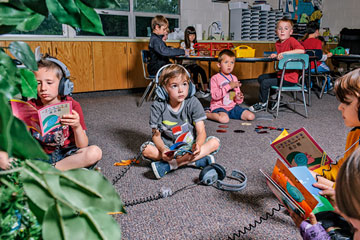
A group of Utah first-graders listen and read along in Mandarin.
(2 of 6)
When it comes to language, there's no such thing as starting too early--and it turns out the brain can be bilingual even before birth. The human auditory system is functional from the third trimester on, and the loudest thing an in utero baby hears is its mother's voice, speaking whatever language or languages she knows. Those sounds, with their characteristic rhythms and phonemes, are poured straight into the baby's brain and become comfortingly familiar.
Of course, it isn't easy to get inside a newborn's mind and determine what it does and doesn't like, but with language at least, investigators have figured out a method. The more vigorously a comfortable, well-fed baby sucks on a pacifier, the more stimulated it is by its environment. Developmental psychologist Krista Byers-Heinlein of Concordia University in Montreal has used this technique to study babies 3 days old and younger. The mothers of some of the children were monolingual English speakers; the mothers of the others spoke both English and Tagalog, a language common in parts of Canada where there are high concentrations of Filipino immigrants.
When the babies with pacifiers were played recordings from multiple languages, those with monolingual moms sucked harder only when they heard English; the others perked up both at English and at Tagalog. "You think, These babies are newborns--how can they be bilingual?" says Byers-Heinlein. "But their mothers' voices affected their preferences."
That exceedingly early start on language only accelerates as it goes along. Research by cognitive neuroscientist Janet Werker of the University of British Columbia and others extended Byers-Heinlein's work to babies who were a few months old, trying to determine if they could distinguish between languages by sight alone, watching silent videos of adults reciting lines from The Little Prince in English and French. In this case it was eye contact--the amount of time they spent looking before they got bored and looked away--that indicated their interest and recognition. From 4 to 6 months of age, babies from both monolingual English homes and bilingual French-English homes could tell the difference. But by 8 months, the monolinguals dropped out of the race, and only the bilinguals could manage the task.
At Spring Lane Elementary School outside Salt Lake City, the kids are a good deal more than 8 months old, but their brains are clearly still very language friendly. On a recent morning late in the school year, a class of first-graders learning Mandarin had broken down into smaller groups, working together on various assignments. One cluster of five kids sat on the floor, listening to a Mandarin-language story through headphones while reading along in books. The other children were busy with writing lessons. Their teacher, April Ridge, 30, who learned to speak Mandarin when she was 21 in preparation for two years as a Mormon missionary in Taiwan, was quietly coaching one little girl when the bell sounded. She looked up and made a series of rapid-fire announcements in fluent Mandarin that appeared to have something to do with getting coats on for recess or hands washed for lunch or who knew what, but if the instructions were a mystery to the monolinguals present, they made perfect sense to the kids, who scrambled and obeyed.
